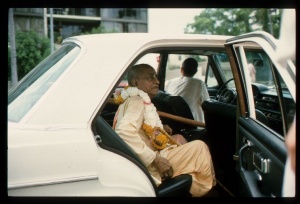CC Madhya 21.112: Difference between revisions
m (1 revision(s)) |
(Vanibot #0054 edit - transform synonyms into clickable links, which search similar occurrences) |
||
| (One intermediate revision by one other user not shown) | |||
| Line 1: | Line 1: | ||
{{ | [[Category:Sri Caitanya-caritamrta - Madhya-lila Chapter 21|C112]] | ||
<div style="float:left">'''[[Sri Caitanya-caritamrta|Śrī Caitanya-caritāmṛta]] - [[CC Madhya|Madhya-līlā]] - [[CC Madhya 21|Chapter 21: The Opulence and Sweetness of Lord Śrī Kṛṣṇa]]'''</div> | |||
<div style="float:right">[[File:Go-previous.png|link=CC Madhya 21.111|Madhya-līlā 21.111]] '''[[CC Madhya 21.111|Madhya-līlā 21.111]] - [[CC Madhya 21.113|Madhya-līlā 21.113]]''' [[File:Go-next.png|link=CC Madhya 21.113|Madhya-līlā 21.113]]</div> | |||
{{CompareVersions|CC|Madhya 21.112|CC 1975|CC 1996}} | |||
{{RandomImage}} | |||
==== TEXT 112 ==== | ==== TEXT 112 ==== | ||
<div | <div class="verse"> | ||
gopyas tapaḥ kim acaran yad amuṣya rūpaṁ | :gopyas tapaḥ kim acaran yad amuṣya rūpaṁ | ||
lāvaṇya-sāram asamordhvam ananya-siddham | :lāvaṇya-sāram asamordhvam ananya-siddham | ||
dṛgbhiḥ pibanty anusavābhinavaṁ durāpam | :dṛgbhiḥ pibanty anusavābhinavaṁ durāpam | ||
ekānta-dhāma yaśasaḥ śriya aiśvarasya | :ekānta-dhāma yaśasaḥ śriya aiśvarasya | ||
</div> | </div> | ||
| Line 14: | Line 18: | ||
==== SYNONYMS ==== | ==== SYNONYMS ==== | ||
<div | <div class="synonyms"> | ||
''[//vanipedia.org/wiki/Special:VaniSearch?s=gopyaḥ&tab=syno_o&ds=1 gopyaḥ]'' — the ''gopīs''; ''[//vanipedia.org/wiki/Special:VaniSearch?s=tapaḥ&tab=syno_o&ds=1 tapaḥ]'' — austerities; ''[//vanipedia.org/wiki/Special:VaniSearch?s=kim&tab=syno_o&ds=1 kim]'' — what; ''[//vanipedia.org/wiki/Special:VaniSearch?s=acaran&tab=syno_o&ds=1 acaran]'' — performed; ''[//vanipedia.org/wiki/Special:VaniSearch?s=yat&tab=syno_o&ds=1 yat]'' — from which; ''[//vanipedia.org/wiki/Special:VaniSearch?s=amuṣya&tab=syno_o&ds=1 amuṣya]'' — of such a one (Lord Kṛṣṇa); ''[//vanipedia.org/wiki/Special:VaniSearch?s=rūpam&tab=syno_o&ds=1 rūpam]'' — the form; ''[//vanipedia.org/wiki/Special:VaniSearch?s=lāvaṇya&tab=syno_o&ds=1 lāvaṇya]-[//vanipedia.org/wiki/Special:VaniSearch?s=sāram&tab=syno_o&ds=1 sāram]'' — the essence of loveliness; ''[//vanipedia.org/wiki/Special:VaniSearch?s=asama&tab=syno_o&ds=1 asama]-[//vanipedia.org/wiki/Special:VaniSearch?s=ūrdhvam&tab=syno_o&ds=1 ūrdhvam]'' — not paralleled or surpassed; ''[//vanipedia.org/wiki/Special:VaniSearch?s=ananya&tab=syno_o&ds=1 ananya]-[//vanipedia.org/wiki/Special:VaniSearch?s=siddham&tab=syno_o&ds=1 siddham]'' — not perfected by any other ornament (self-perfect); ''[//vanipedia.org/wiki/Special:VaniSearch?s=dṛgbhiḥ&tab=syno_o&ds=1 dṛgbhiḥ]'' — by the eyes; ''[//vanipedia.org/wiki/Special:VaniSearch?s=pibanti&tab=syno_o&ds=1 pibanti]'' — they drink; ''[//vanipedia.org/wiki/Special:VaniSearch?s=anusava&tab=syno_o&ds=1 anusava]-[//vanipedia.org/wiki/Special:VaniSearch?s=abhinavam&tab=syno_o&ds=1 abhinavam]'' — constantly new; ''[//vanipedia.org/wiki/Special:VaniSearch?s=durāpam&tab=syno_o&ds=1 durāpam]'' — difficult to obtain; ''[//vanipedia.org/wiki/Special:VaniSearch?s=ekānta&tab=syno_o&ds=1 ekānta]-[//vanipedia.org/wiki/Special:VaniSearch?s=dhāma&tab=syno_o&ds=1 dhāma]'' — the only abode; ''[//vanipedia.org/wiki/Special:VaniSearch?s=yaśasaḥ&tab=syno_o&ds=1 yaśasaḥ]'' — of fame; ''[//vanipedia.org/wiki/Special:VaniSearch?s=śriyaḥ&tab=syno_o&ds=1 śriyaḥ]'' — of beauty; ''[//vanipedia.org/wiki/Special:VaniSearch?s=aiśvarasya&tab=syno_o&ds=1 aiśvarasya]'' — of opulence. | |||
</div> | </div> | ||
| Line 21: | Line 25: | ||
==== TRANSLATION ==== | ==== TRANSLATION ==== | ||
<div | <div class="translation"> | ||
“‘What austerities must the gopīs have performed? With their eyes they always drink the nectar of the form of Lord Kṛṣṇa, which is the essence of loveliness and is not to be equaled or surpassed. That loveliness is the only abode of beauty, fame and opulence. It is self-perfect, ever fresh and unique.’ | “‘What austerities must the gopīs have performed? With their eyes they always drink the nectar of the form of Lord Kṛṣṇa, which is the essence of loveliness and is not to be equaled or surpassed. That loveliness is the only abode of beauty, fame and opulence. It is self-perfect, ever fresh and unique.’ | ||
</div> | </div> | ||
| Line 28: | Line 32: | ||
==== PURPORT ==== | ==== PURPORT ==== | ||
<div | <div class="purport"> | ||
This verse from Śrīmad-Bhāgavatam ([[SB 10.44.14]]) was spoken by the women of Mathurā when they saw Kṛṣṇa in the wrestling arena. | This verse from [[Srimad-Bhagavatam|''Śrīmad-Bhāgavatam'']] ([[SB 10.44.14]]) was spoken by the women of Mathurā when they saw Kṛṣṇa in the wrestling arena. | ||
</div> | </div> | ||
__NOTOC__ | |||
<div style="float:right; clear:both;">[[File:Go-previous.png|link=CC Madhya 21.111|Madhya-līlā 21.111]] '''[[CC Madhya 21.111|Madhya-līlā 21.111]] - [[CC Madhya 21.113|Madhya-līlā 21.113]]''' [[File:Go-next.png|link=CC Madhya 21.113|Madhya-līlā 21.113]]</div> | |||
__NOTOC__ | |||
__NOEDITSECTION__ | |||
Latest revision as of 22:48, 19 February 2024

A.C. Bhaktivedanta Swami Prabhupada
TEXT 112
- gopyas tapaḥ kim acaran yad amuṣya rūpaṁ
- lāvaṇya-sāram asamordhvam ananya-siddham
- dṛgbhiḥ pibanty anusavābhinavaṁ durāpam
- ekānta-dhāma yaśasaḥ śriya aiśvarasya
SYNONYMS
gopyaḥ — the gopīs; tapaḥ — austerities; kim — what; acaran — performed; yat — from which; amuṣya — of such a one (Lord Kṛṣṇa); rūpam — the form; lāvaṇya-sāram — the essence of loveliness; asama-ūrdhvam — not paralleled or surpassed; ananya-siddham — not perfected by any other ornament (self-perfect); dṛgbhiḥ — by the eyes; pibanti — they drink; anusava-abhinavam — constantly new; durāpam — difficult to obtain; ekānta-dhāma — the only abode; yaśasaḥ — of fame; śriyaḥ — of beauty; aiśvarasya — of opulence.
TRANSLATION
“‘What austerities must the gopīs have performed? With their eyes they always drink the nectar of the form of Lord Kṛṣṇa, which is the essence of loveliness and is not to be equaled or surpassed. That loveliness is the only abode of beauty, fame and opulence. It is self-perfect, ever fresh and unique.’
PURPORT
This verse from Śrīmad-Bhāgavatam (SB 10.44.14) was spoken by the women of Mathurā when they saw Kṛṣṇa in the wrestling arena.